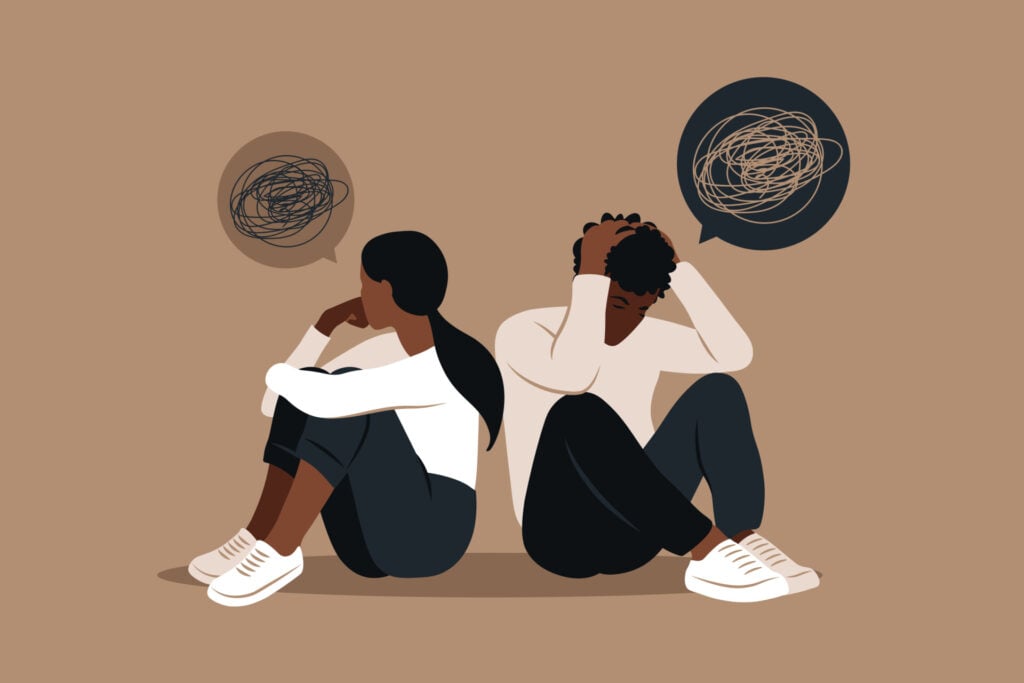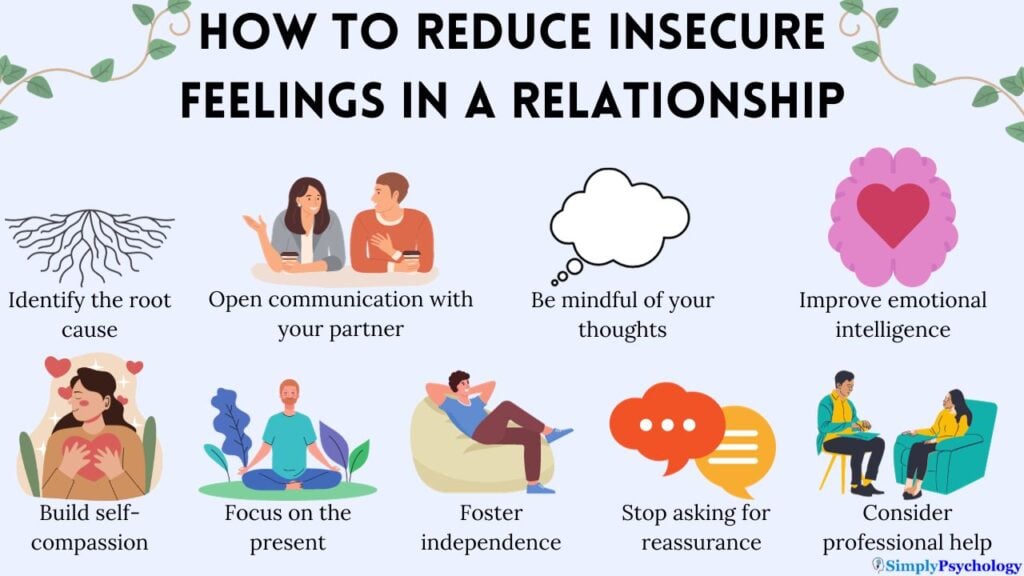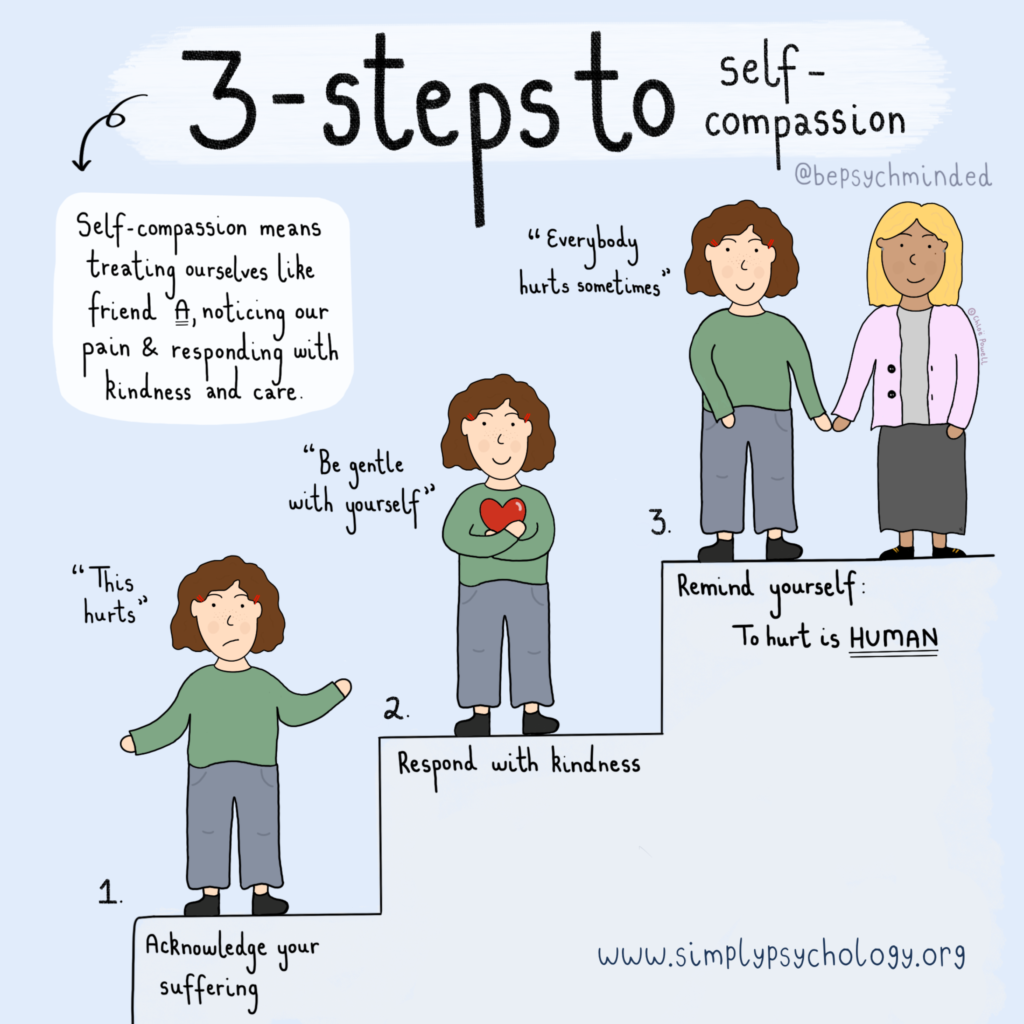Do you constantly doubt yourself and your worthiness of love in your relationship? Do you have excessive fears of abandonment or rejection? If so, you likely suffer from relationship insecurity – and you’re not alone.
Insecurity can sabotage even the strongest relationships. The good news is that you can take steps to overcome these anxious feelings.
In this article, we’ll help you identify the root causes of your relationship worries and outline actionable solutions to start feeling more secure, including:
- Practical communication strategies to openly discuss insecurities
- Managing unhelpful thoughts through mindfulness techniques
- Building self-compassion to reduce anxiety and self-judgment
- Setting boundaries to improve self-confidence
- And more tips to stop the cycle of doubt, worry and instability
The key is being proactive. Rather than waiting for your partner to change or for your worries to subside on their own, we’ll give you the tools to take control. With consistent effort, you can create major positive shifts.

Being insecure in a relationship refers to a lack of confidence within a romantic relationship, as it often involves doubting your worthiness of love and fearing the loss of the relationship. It means that one or both partners do not feel assured or stable in the relationship, often fearing that it may be at risk in some way.
Common causes of relationship insecurity include past traumas or betrayals, poor communication, and unresolved conflicts.
Relationship insecurity should be addressed because it can lead to unhealthy behaviors such as possessiveness or self-sabotage.
Research has consistently found that relationship/attachment insecurity predicts lower relationship quality and problematic dynamics, especially during stressful times such as the COVID-19 pandemic (Simpson & Rholes, 2017).
Relationship insecurity can manifest in various ways, causing distress and tension. Here are some examples:
- Constantly seeking reassurance and validation from your partner about their feelings or commitment (e.g., needing constant affirmations or repeatedly asking if they still love you, are attracted to you, or are going to leave you).
- Fear of being abandoned or rejected. This can cause clingy behavior (e.g., being overly dependent on them).
- Looking for signs of rejection (e.g., overthinking and analyzing your partner’s words and actions, always looking for signs that you are not loved or valued).
- Codependency: putting their needs and wants before your own due to fear of being rejected or abandoned.
- Difficulty trusting your partner, even with no apparent reason to be suspicious.
- Excessive jealousy: such as feeling threatened by your partner’s interactions with friends, family, or others.
- Low self-esteem which makes you feel like you are not good enough for your partner.
- Self-sabotaging behavior (creating problems because you believe it is inevitable that things will go wrong).
Below are some of the ways in which you can help reduce feelings of insecurity in your relationship:

Identify the root cause
Take time to understand your insecurities by reflecting on what makes you feel insecure in relationships. What are your fears and doubts? Consider past experiences as unresolved childhood issues or past relationships that can contribute to insecurity.
Look for patterns by paying attention to your thoughts and noticing when and why you feel insecure. Is it related to trust, self-esteem, or fear of abandonment? Are you telling yourself negative things about yourself or your partner?
Furthermore, self-help books and therapy provide valuable tools for self-discovery, helping you recognize deep-seated insecurities.
Once you have determined the underlying issues, it is easier to take action to address them. Use practical tips such as building self-awareness, reframing unhelpful thoughts, removing people who exacerbate your insecurities from your life, and seeking support from trusted friends or professionals.
Susan Winter, relationship expert and author, suggests asking yourself three vital questions if you feel insecure in your relationship:
- Is it me? Am I inherently insecure?
- Is it my partner? Is my partner doing something or not doing something that is creating me to feel insecure? If so, is it conscious or unconscious?
- Is it the situation I am in? Am I in a place with my partner that is naturally uncomfortable and unsettling?
Open communication with your partner
Communicate openly and honestly with your partner about your needs and insecurities. They may offer reassurance or support or alleviate your worries. Additionally, they could have helpful insights or suggestions. For example, a partner may help identify the root cause of insecurity, especially in long-term relationships.
Dr. Alexandra H. Solomon suggests “setting your partner up for success by articulating up front, as best you can, what it is that you want from them: a sounding board, sympathy, advice.”
Tips for open communication:
- Be honest, vulnerable, and specific. Tell your partner what you are insecure about and why.
- Avoid blaming your partner for your insecurities. Dr. Steve Maraboli states that “relationships fail when people take their own insecurities and project them as their partner’s flaws.”
- To avoid making them feel attacked, use “I” statements (e.g., instead of saying, “You make me feel insecure,” say, “I feel insecure when you…”).
- Encourage your partner to share their thoughts and feelings, too. Listen actively without interrupting or becoming defensive.
“If my husband and I get in a big fight, he can’t just leave the house- this sets my attachment anxiety on overdrive. If he needs a few minutes to cool down, he’ll text me “I’m going for a walk” and I don’t go into panic mode. This is just one example (and sort of extreme) but examine if there’s anything in your relationship that contributes to or exacerbates your anxiety.”
‘Bella’
Be mindful of your thoughts
Dwelling on a negative thought makes it appear more important and accurate than it actually is. When we overthink, we are more likely to come up with unhelpful or insecure thoughts even if we did not initially have one.
Overthinking leads to anxiety and tension within yourself and your relationship.
Journaling is a helpful tool for recognizing and addressing unhelpful thought patterns and recurring negative beliefs about yourself or your relationship.
When you feel insecure, write down your thoughts and feelings. What are you telling yourself about yourself or your partner?
Once identified, you can become more aware and mindful of your thoughts. Instead of dwelling on insecure thoughts, recognize them and let them go without giving them energy or attention.
You can also challenge unhelpful thoughts and try to replace them with more helpful ones.
Challenging your thoughts involves questioning their accuracy. Ask yourself if these thoughts are really true. Are you basing them on evidence or assumptions and fears? Can you come up with a more positive and realistic interpretation of the situation?
“When I’m insecure, I notice myself becoming more self-involved. Telling myself negative stories. Looking for things that prove my feelings. To balance these things, I do the opposite as well. I tell myself stories that show the same behavior in a positive light!”
‘Taylor’
Focus on the present
It is easy to overthink and ruminate about past relationship issues or worries about the future.
Here are some tips on how to focus on the present:
- Meditate regularly.
- Practice mindfulness (e.g., yoga, tai chi, or taking a few minutes to focus on your breath).
- Write down things you are grateful for each day to appreciate the good things in your life.
- Notice your surroundings–what do you see, hear, smell, taste, and feel?
- When you notice your mind wandering, gently bring it back to the present moment.
- Do not judge or dwell on your thoughts–acknowledge them and let them go.
- Pursue hobbies and interests outside of the relationship. This adds fulfillment to your life and reduces the tendency to fixate on relationship insecurities.
Improve emotional intelligence
Emotional intelligence refers to the ability to recognize, understand, manage, and effectively use one’s own emotions and those of others.
It encompasses skills like empathy, self-awareness, and interpersonal communication. Improving emotional intelligence offers numerous benefits, including making individuals more resilient, able to adapt to change, and better equipped to handle stress and conflicts.
Practicing empathy can help you understand your partner’s feelings and perspectives, promoting better communication and emotional connection.
Additionally, learning to manage your emotions effectively will help you express them constructively instead of reactively, leading to fewer arguments and better conflict resolution.
People with higher emotional intelligence have a better ability to navigate relationship challenges with confidence and security.
Build self-compassion
Self-compassion means treating yourself with the same care and kindness that you would offer to a friend or partner. It involves being patient with yourself as you grow and learn.

Tips for building self-compassion:
- When you make a mistake, be understanding and forgiving. Remind yourself that everyone makes mistakes and that you are still worthy of love and respect.
- Instead of trying to be perfect, accept your flaws and learn to love yourself for who you are.
- Remind yourself of your strengths and what you are good at when you feel insecure.
- Do things that make you happy, bring you comfort, and make you feel good about yourself.
- Surround yourself with supportive people who offer you love, understanding, and encouragement.
- Explore self-compassion exercises (e.g., the self-compassion break).
“I was wildly insecure. After many years what I discovered the best thing to do is to assure yourself of your own confidence, find worth in you as a man and as a partner. Only by feeling that… will you feel confident about yourself.”
‘Cal’
Foster independence
Establish healthy boundaries with your partner by clearly communicating your limits and expectations, and what you need from them (e.g., “I need some time to myself every day”).
Furthermore, have your own interests, hobbies, and social activities. Make time for activities that you enjoy without your partner.
For example, you might join a book club, take a dance class, or start a blog. Spending time with yourself could include reading, taking a bath, or going for a walk.
Engaging in activities that make you feel confident in yourself and your abilities can enhance your self-esteem, reducing dependency on external validation. Ways to boost your confidence include setting goals and achieving them and learning new things.
Stop asking for reassurance
To overcome your constant need for reassurance, consider these steps:
- Challenge yourself to trust your partner’s feelings and intentions.
- When you feel the urge to ask for reassurance, take a moment to challenge your unhelpful thoughts.
- Practice healthy ways to soothe yourself (e.g., taking a few deep breaths, listening to calming music, doing gentle stretching).
- Talk to your partner about your need for reassurance and how it is affecting your relationship. Let them know that you are working on reducing your need for reassurance and that you appreciate their patience.
Consider professional help
If your feelings of insecurity are affecting your ability to maintain fulfilling and secure relationships, consider seeking guidance from a therapist or counselor.
A qualified mental health professional can provide a safe space to explore your feelings and provide you with tools and strategies to:
- address the root causes of your insecurity;
- develop healthier patterns of thinking and behavior in relationships;
- challenge unhelpful thoughts;
- develop realistic and positive beliefs about yourself and your relationships;
- cope with emotions in a healthy way (they can teach you coping mechanisms such as relaxation techniques and assertiveness training);
- build self-confidence and self-esteem;
- improve communication skills.
Embrace insecurity as a part of being human.
Whilst excessive self-doubt is detrimental to your confidence and relationships, having mild insecurities is just a side effect of being human.
It is easy to believe that you are the only one experiencing such emotions, but in reality, insecurity is a common human experience. Acknowledging your insecurities can lead to greater self-awareness, self-acceptance, and resilience.
“If you are searching for the person who always understands you, never does anything wrong and always “gets you”, please stop looking. Even happy couples have conflicts. It’s how they fix them that is the key. When done with care and awareness, often the repair strengthens the relationship.”
‘Eleanor’
It is crucial to understand that everyone, at some point in their lives, battles feelings of insecurity, whether it is related to relationships, work, or personal identity.
Acknowledging and accepting your vulnerabilities can lead to increased emotional intelligence, empathy, and compassion for yourself and others, as it reminds you that imperfection is a shared human experience.
Recognizing that everyone experiences their own insecurities can help you be supportive rather than judgmental, which is essential for building meaningful relationships.
Moreover, renowned psychologist Brené Brown’s work on vulnerability emphasizes the idea that embracing insecurity is a path to genuine connection (Brown, n.d.). In her TED Talk and books, she emphasizes that vulnerability is the birthplace of trust and authenticity in human relationships.
If you actively put the strategies mentioned in this article into practice and repeat them as often as necessary, you will be able to manage insecurities better.
Although you/your partner will still occasionally feel those emotions—you are only human, after all—your choices and self-perception will be impacted less by your insecurities.
FAQs
How can insecurities ruin a relationship?
Insecurities can have a detrimental impact on a relationship in various ways, such as causing:
- doubt and distrust;
- arguments and conflict;
- emotional distance as the insecure partner may withdraw from their partner;
- low self-esteem as the insecure partner may compare themselves to others, making it difficult for them to feel good about the relationship;
- individuals to project their doubts onto their partner, unfairly accusing them of wrongdoing.
Excessive insecurity can lead to jealousy, possessiveness, suspicion, and controlling behavior.
It can also cause one partner to constantly seek reassurance and validation, which can become emotionally exhausting for the other.
Moreover, insecurity can cause communication issues as individuals may struggle to express their feelings or concerns effectively, fearing rejection or criticism. This lack of open and honest communication can hinder conflict resolution and prevent the growth of a healthy emotional connection.
What can trigger someone’s insecurities?
Someone’s insecurities can be triggered by a complex interplay of various factors.
Traumatic life events such as the loss of a loved one or going through a divorce can impact a person’s sense of security.
Negative past experiences, such as bullying or abusive relationships, can also leave emotional scars and create a belief that we are not good enough or worthy of love and acceptance.
Additionally, personal vulnerabilities, such as a negative self-image or a history of rejection, can magnify feelings of inadequacy and self-doubt when faced with challenges.
As noted by Author Sue Grafton, “Insecure people have a special sensitivity for anything that finally confirms their own low opinion of themselves.”
Furthermore, mental health conditions, such as anxiety and depression, can make us feel overwhelmed, stressed, and hopeless, making us more likely to focus on our flaws.
Societal pressures and media influences can also set unrealistic standards and expectations, causing individuals to compare themselves unfavorably to others.
How can being cheated on affect the relationship?
Here are some ways that being cheated on can have a devastating impact on a relationship:
- Difficulty trusting your partner again after they have betrayed your trust, causing anxiety and insecurity in the relationship.
- Problems communicating openly and honestly. Partners may become defensive or avoid discussing the issue altogether, creating tension and conflict.
- Emotional distress–being cheated on can cause a range of emotions, including shock, betrayal, anger, sadness, and loneliness, which can be overwhelming and affect the well-being of both partners.
- Emotional distance and difficulty feeling close to your partner.
- Decreased intimacy and difficulty being physically and emotionally intimate with your partner.
- The person who was cheated on may experience a blow to their self-esteem and self-worth.
- Relationship breakdown–if the couple is unable to overcome the trust issues and other problems, the relationship may be unsalvageable.
If you have been cheated on, it is important to seek support from friends, family, or a therapist. Take some time for yourself to heal and process what has happened.
References
Feeling insecure | Relate. (n.d.). https://www.relate.org.uk/get-help/feeling-insecure
Karney B. R., Bradbury T. N. (1995). The longitudinal course of marital quality and stability: A review of theory, methods, and research. Psychological Bulletin, 118(1), 3–34. https://doi.org/10.1037/0033-2909.118.1.3
Simpson J. A., Rholes W. S. (2017). Adult attachment, stress, and romantic relationships. Current Opinion in Psychology, 13, 19–24.
mindbodygreen. (2023, May 5). 8 Signs You’re Insecure In Your Relationship, From Psychologists. Mindbodygreen. https://www.mindbodygreen.com/articles/insecure-in-relationships
Feeling Insecure in Your Relationship?. (2023). Retrieved 12 September 2023, from https://www.psychologytoday.com/gb/blog/constructive-wallowing/202009/feeling-insecure-in-your-relationship
mindbodygreen. (2023b, May 5). 8 Signs You’re Insecure In Your Relationship, From Psychologists. Mindbodygreen. https://www.mindbodygreen.com/articles/insecure-in-relationships
How to handle relationship insecurity | Tony Robbins. (2023, June 30). tonyrobbins.com. https://www.tonyrobbins.com/ultimate-relationship-guide/insecure-in-a-relationship/
Gupta, S. (2023). Insecurity in relationships: Ways to cope. Verywell Mind. https://www.verywellmind.com/coping-with-insecurity-in-a-relationship-5207949
Geller, L. (2019, May 16). 7 Steps To Actually Overcome Insecurities In Your Relationship. Women’s Health. https://www.womenshealthmag.com/relationships/a27437438/relationship-insecurity/
MasterClass. (2022, June 14). Insecurities in a Relationship: How to Overcome Insecurities – 2023 – MasterClass. https://www.masterclass.com/articles/insecurities-in-a-relationship
8 Practical tips to Stop being Insecure & Build Self-Esteem. (2023, August 11). IvyPanda. https://ivypanda.com/blog/8-practical-tips-to-stop-being-insecure/
Detka, E., Detka, E., & Detka, E. (2023). Protecting your Intimate Relationship from the Impact of Work Stress. Dr. Alexandra Solomon – Supporting Deep, Personal Growth and Authentic, Intimate Connection. https://dralexandrasolomon.com/protecting-your-intimate-relationship-from-the-impact-of-work-stress/
Maintaining healthy relationships and mental wellbeing. (n.d.). nhs.uk. https://www.nhs.uk/every-mind-matters/lifes-challenges/maintaining-healthy-relationships-and-mental-wellbeing/
Insecurity Counselling UK – Therapy. (n.d.). https://www.therapycounselling.org/insecurity
Smith, M., MA. (2023). Improving Emotional intelligence (EQ). HelpGuide.org. https://www.helpguide.org/articles/mental-health/emotional-intelligence-eq.htm
Self-Compassion. (n.d.). Self-Compassion Exercises by Dr. Kristin Neff. https://self-compassion.org/category/exercises/
Darcy, A. M., & Jacobson, S. (2023). Self-Compassion – a better way to raise your Self-Esteem? Harley TherapyTM Blog. https://www.harleytherapy.co.uk/counselling/self-compassion.htm
Four Ways to Stop Feeling Insecure in Your Relationships. (2023). Retrieved 13 September 2023, from https://www.psychologytoday.com/gb/blog/living-forward/201609/four-ways-stop-feeling-insecure-in-your-relationships
Wignall, N. (2023). 11 Ways to stop feeling Insecure in a relationship. Nick Wignall. https://nickwignall.com/11-ways-to-stop-feeling-insecure-in-a-relationship/
Touroni, E. (2022). Why do I need constant reassurance? The Chelsea Psychology Clinic. https://www.thechelseapsychologyclinic.com/blog/why-do-i-need-constant-reassurance/
Counselling Directory. (2023). Overcoming relationship anxiety: What it is and how to stop it. Counselling Directory. https://www.counselling-directory.org.uk/memberarticles/overcoming-relationship-anxiety-what-it-is-and-how-to-stop-it
Pace, R., Pace, R., & Pace, R. (2023). Reassurance in relationships: Examples, Signs & Ways to deal. Marriage Advice – Expert Marriage Tips & Advice. https://www.marriage.com/advice/relationship/reassurance-in-a-relationship/
Brown, B. (n.d.). The power of vulnerability [Video]. TED Talks. https://www.ted.com/talks/brene_brown_the_power_of_vulnerability
Relationship Insecurity: 12 Steps to Overcoming Self Doubt. (n.d.). Relish. https://hellorelish.com/articles/12-steps-overcome-relationship-insecurity.html
User, S. (n.d.). 5 ways to deal with an insecure partner. Insight Therapy LLC. https://www.insighttherapyllc.com/mental-health-articles/99-5-ways-to-deal-with-an-insecure-partner
Mairanz, A. (2019). How to Navigate a Relationship with an Insecure Partner. Empower Your Mind Therapy. https://eymtherapy.com/blog/how-to-navigate-a-relationship-with-an-insecure-partner/
How to Help an Insecure Partner Feel Loved. (2023). Retrieved 14 September 2023, from https://www.psychologytoday.com/gb/blog/social-instincts/202306/how-to-make-an-insecure-partner-feel-safe-and-loved
Nash, J., PhD. (2023b). How to set healthy boundaries & Build positive relationships. PositivePsychology.com. https://positivepsychology.com/great-self-care-setting-healthy-boundaries/
Boundaries: What are they and how to create them | Wellness Center | University of Illinois Chicago. (n.d.). https://wellnesscenter.uic.edu/news-stories/boundaries-what-are-they-and-how-to-create-them/
Author, M. (2023). Insecurities: Types, Causes, Effects, Tips, And More. Mantra Care. https://mantracare.org/therapy/what-is/insecurities/
Mishra, A. (2023, July 4). 101 Insecurity in Relationship Quotes to Find Hope And Reassurance. PINKVILLA. https://www.pinkvilla.com/lifestyle/relationships/insecurity-in-relationships-quotes-1227509
Moss, R. (2017, June 7). How Being Cheated On Affects Your Mental Health And Behaviour. HuffPost UK. https://www.huffingtonpost.co.uk/entry/how-being-cheated-on-affects-your-mental-health-and-behaviour_uk_5937b2f1e4b0aba888b9e6af


